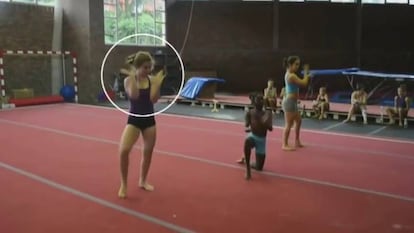The avoidable end to 16-year-old Spanish gymnastics champion’s dream
Orthopedist blamed for diagnosis failure that led to Desirée Vila losing a leg

On February 26, 2015, Desirée Vila, then a 16-year-old Spanish junior youth gymnastics champion from Vigo, in the northwestern region of Galicia, fell while training, breaking her tibia, fibula and meniscus and severely damaging an artery in her right leg. The previous year, she had taken part in the World Championships, and was in training to compete for a place to represent Spain in the European Championships.
Circulatory problems led to her leg being amputated six days later. Her family brought legal action for personal injury against Pedro Larrauri, the orthopedist who initially treated her at El Castro, a privately run medical center in Vigo, and at the trial that began last week in the port city, the public prosecutor has called for a two-year prison sentence, a four-year ban on practicing his profession and €2 million in compensation.
During the trial, the prosecution has focused on the days following the accident, when Vila’s condition worsened due to circulatory problems, highlighting the lack of any medical reports by Laurrari.
Desirée Vila is still receiving psychological help and undergoing rehabilitation
Larrauri has pleaded innocent to the charges, saying at the trial: “I never thought that the injury would end up like this, I was the first to be surprised and saddened, I wish Desirée all the best.”
The prosecutor questioned the orthopedist, who was on call, about the first moments after Vila attended the medical center, asking why he had not seen her immediately, instead of waiting until the following day, despite her injuries and her symptoms.
Vila had previously told the court about her condition while she was at the medical center, saying: “My leg was cold and I was aware they were doing nothing to remedy it, and I even told my parents and the nursing staff.”
Larrauri said that he was not in the medical center at the time Vila was admitted, but was available. “If the doctor on call had seen symptoms of ischemia [inadequate supply of blood to a part of the body], he would have told me and I would have rushed there,” he said.
Initially it was ascertained that there was limited blood supply to Vila’s leg. But Larrauri was reportedly alerted by the doctor on call that the patient could not move her toes and had little feeling. However, the orthopedist did not go to the hospital.
“I did not suspect that she had ischemia or a damaged artery and detailed tests were not taken so as not to bother the patient if there was no risk,” he said.
Desirée Vila was training to compete in the European Championships
But evidence given by a nurse contradicted Larrauri’s testimony. She said that before the orthopedist saw Vila she had already noted that the girl’s pulse was very weak. Larrauri replied that the nurse’s reading of Vila’s pulse was “unreliable,” adding that the surgeon who carried out the amputation at the city’s Povisa private hospital “blamed me for it.”
The prosecution has argued that Larrauri’s failure to act immediately after Vila was admitted to the medical center was a key mistake. If she had received vascular surgery, her leg could have been saved, said the prosecutor, “because the amputation was perfectly foreseeable and avoidable with an adequate first diagnosis followed by therapy.”
Larrauri insisted that Vila’s condition was improving and that the leg was not at risk when she was transferred to the Povisa hospital. He added that a lack of oxygenation in the leg would require it to be amputated within six hours, but instead, six days passed, two of them in the Povisa hospital “where they amputated because they confused a neurological injury with ischemia.”
The orthopedist’s defense criticized the court for not calling the surgeon at the Povisa hospital that amputated Vila’s leg, arguing that the hospital’s medical reports were unclear.
In response, the prosecution said that El Castro’s procedures raised serious questions. “It was anything but transparent and it has been demonstrated that they hid medical information,” said the prosecutor, adding that during the investigation ahead of the trial, an expert witness noticed that data from the center about Vila’s admission had been manipulated, with some documents having been erased and others altered.
Two years on, the court heard how Desirée Vila is still receiving psychological help and undergoing rehabilitation as she adapts to a new life that she hopes will allow her to remain involved in Spanish sport at the highest level.
English version by Nick Lyne.
Tu suscripción se está usando en otro dispositivo
¿Quieres añadir otro usuario a tu suscripción?
Si continúas leyendo en este dispositivo, no se podrá leer en el otro.
FlechaTu suscripción se está usando en otro dispositivo y solo puedes acceder a EL PAÍS desde un dispositivo a la vez.
Si quieres compartir tu cuenta, cambia tu suscripción a la modalidad Premium, así podrás añadir otro usuario. Cada uno accederá con su propia cuenta de email, lo que os permitirá personalizar vuestra experiencia en EL PAÍS.
¿Tienes una suscripción de empresa? Accede aquí para contratar más cuentas.
En el caso de no saber quién está usando tu cuenta, te recomendamos cambiar tu contraseña aquí.
Si decides continuar compartiendo tu cuenta, este mensaje se mostrará en tu dispositivo y en el de la otra persona que está usando tu cuenta de forma indefinida, afectando a tu experiencia de lectura. Puedes consultar aquí los términos y condiciones de la suscripción digital.








































